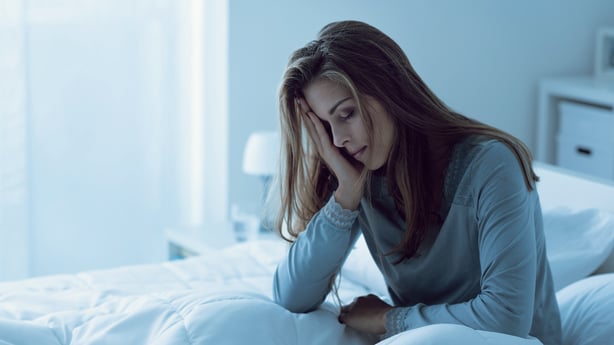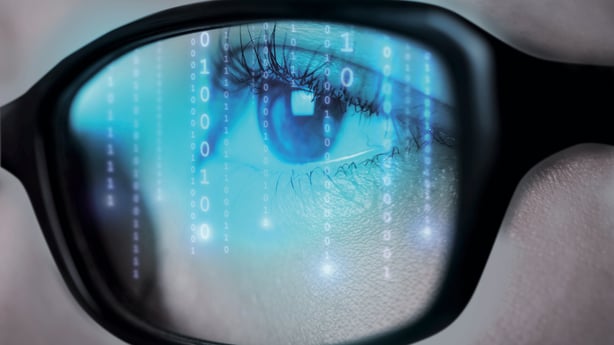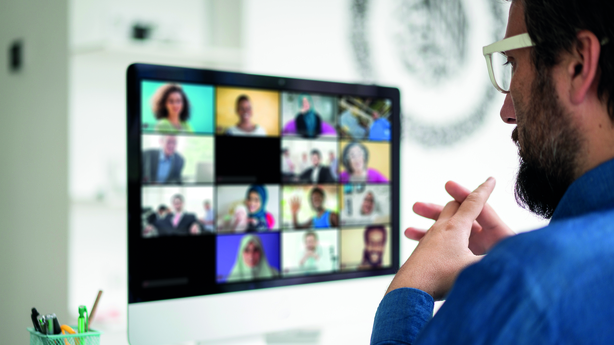Ae you blue in the face with worrying over the damage of all that time spent in front of screens? Claire O'Mahony finds out what harm blue light can cause.
Of the seven colours that make up the visible spectrum, blue light is the one that’s been grabbing the most attention of late. The main source is sunlight but the reason why blue light has become such a talking point is that it’s also emitted by digital screens, as well as fluorescent and LED lighting.
Given that we’ve all been spending an a lot of time on our devices over the last year, thanks to work, scrolling through social media, catching up on news headlines and online shopping, it’s understandable that we want to know about any potential impacts this could have on health.
In this respect, blue light exposure has been blamed for a range of problems including eye damage and sleep issues, with suggestions also being made that blue light has an ageing effect on skin. But is it really all bad?

Sleep
Blue light in fact has benefits and plays a major role in the body by helping to regulate circadian rhythms, our internal body clock. This enables us to keep alert and productive throughout the day, although clearly we don’t need to be so at night, and this is where too much blue light can become problematic.
Studies have indicated that blue light more than any other coloured light suppresses melatonin, the natural hormone which acts on receptors in the body to make you sleepy. "It’s important to know that blue light is appropriate and important and we need it but at the wrong time it can have a negative impact on our sleep-wake cycles" says sleep coach and health scientist Tom Coleman.
"It takes very little blue light in the evenings to cause a disruption in melatonin production and thus push our sleep back." According to the health expert, devices, and the blue light that they give off are what we should be primarily focused on. "Televisions aren’t as bad because of the proximity to them, as we tend to sit back but device screens are at the kind of distance and brightness that will impact our sleep."
His recommendation is to timetable turning off blue light from 6pm. "On most digital devices and on phones you can go into the 'brightness’ setting and you can cut out the blue light, and you can schedule for when that starts to happen. You can do this on laptops too and people need to be mindful that your laptop is something that can emit blue light."

Eyes
With a short wavelength and a high energy level, blue light can penetrate the eyes easily and it’s been suggested that too much exposure could damage the light-sensitive cells in the retina. This is partly why blue-light blocking glasses have risen in popularity but while these are effective in reducing the amount of blue light entering the eye, and they may improve sleep, their role in preventing eye damage is unproven.
Optometrist Kerril Hickey, chairman of Specsavers Ireland says the evidence isn’t there to show that exposure to blue light causes eye damage.
"The level of blue light exposure from screens is a lot less than it is from natural daylight so any damage at all, would be very little," he says. "What the science is saying is that they’re not finding conclusive evidence that blue light will cause damage."
He adds: "The best research that’s available today suggests that blue light blocking glasses don’t improve the visual performance or protect the eye. There isn’t any research at present that tells us that blue light does lead to eye strain. Eyes will feel strained when they are looking at screens all day but that’s down to a number of reasons such as not having enough breaks, if you’re on meeting after meeting on a screen or you’re in a classroom and you’re going from Zoom to Zoom to Zoom.
When you’re concentrating for long periods of time, not blinking enough, getting glare from other sources around, whether it’s windows or lights and that’s making people squint, that will certainly, and we know factually and scientifically, cause strain."
If eye strain is an issue for you, Hickey advises that the quickest and most effective way to combat this is the 20-20-20 rule. "Every 20 minutes take a break from your screen for 20 seconds and look at something 20 feet away," he says. "When you’re working up close to a screen you’re working the eye much harder and when you’re focusing 20 feet or six metres away, you’re relaxing the eye and the eyes are now straight as opposed to being turned in. That has been proven to help."
Another tip is to be mindful of blinking. "When you’re concentrating and focusing up close, your blink rate drops to about a third of what it should be and every time you blink you’re lubricating the eye, and lubricating the cornea," he says. "If you can remind yourself to do some blinking and if that doesn’t work you can get eye drops to help. You can also get an antiglare screen attached to the monitor of your computer."

Skin
Another area of concern is what exposure to blue light is doing to our skin. ‘Zoom face’ became a pandemic phenomenon as spending more time looking at ourselves on screens resulted in us becoming aware of ‘imperfections’ that we may not noticed before.
The fine lines, wrinkles and skin discolouration that are now being highlighted on video conference call, may have been caused in the first place by blue light from our devices and the trend for ‘blue light beauty’ is growing as consumers look to products that can protect their skin.
Dr. Katherine Mulrooney of the Dr Mulrooney Clinic which specialises in cosmetic dermatology explains how your screen time might be adding years to your face. "Blue light AKA High Energy Visible (HEV) Light, is part of the visible light spectrum and similar to UV light causes skin ageing via free radical damage. Blue light penetrates deeper into the dermal layers of the skin, causing direct damage to collagen and elastin strictures, thereby weakening the structural support of the skin, which in turn leads to premature skin ageing," she says.
"Studies have also shown that in the longer term, blue light contributes to irregular pigmentation, which again is pro-ageing. Lastly, blue light affects our circadian rhythm confusing both our brains and skin cells and disrupting the normal skin repair that takes place during sleep." She stresses that it’s important to be aware of how much time we are all spending on devices that emit blue limit and to limit that time.
And the best way to protect beleaguered skin from blue light damage? Sunscreen, says Dr Mulrooney. "Use a broad spectrum physical SPF as the zinc oxide works well to reduce the penetration of blue light on the skin, and it protects optimally from UV light also," she says.
In terms of skincare ingredients that can help offset blue light damage, the doctor suggests potent antioxidants, "to offset the oxidative stress causes by blue light and other environmental skin stressors" and glycolic acid "to minimise irregular pigmentation."


